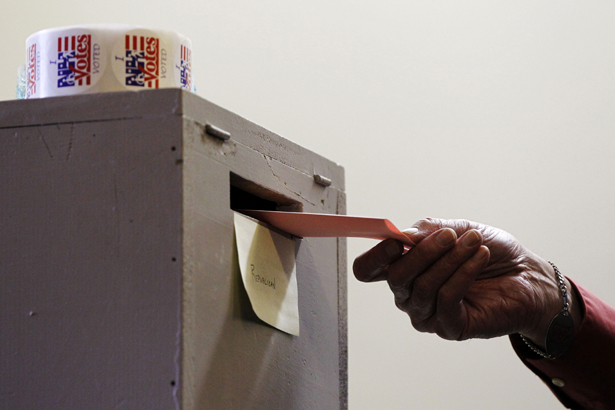 AP Photo/Matt Rourke.)
AP Photo/Matt Rourke.)
Yesterday, Virginia Governor Bob McDonnell announced in his 2013 State of the Commonwealth speech that he supports Republican-sponsored bills to automatically restore civil rights—including voting rights—for nonviolent felony offenders. Virginia is one of four states that permanently bar felony offenders from voting or running for office even after they’ve already served time in prison and any probation/parole sentence. The governor alone can restore those rights and only after a cumbersome process that includes a two-year wait for nonviolent offenders or a five-year wait for violent offenders. There are roughly 350,000 Virginians, most of then African-Americans, disenfranchised because of this law.
McDonnell is now saying the wait is over for nonviolent offenders—or at least that it should be. Automatic rights restoration will only happen with an amendment to the state’s constitution, which can be done only by the state legislature. According to The Washington Post, Republicans in that legislature gave McDonnell’s appeal a lukewarm response, and those who head the committees responsible for creating such legislation oppose automatic rights restoration.
However, McDonnell was clear about his support for it, saying:
“While we have significantly improved and fast-tracked the restoration of civil rights process, it’s still an executive process. As a nation that believes in redemption and second chances, we must provide a clear path for willing individuals to be productive members of society once they have served their sentences and paid their fines and restitution. It is time for Virginia to join most of the other states and make the restoration of civil rights an automatic process for non-violent offenders.”
Civil rights advocates for voting rights and erasing felony disenfranchisement welcomed McDonnell’s support.
“The governor has embraced the principle of redemption and the legislature should follow his lead,” stated Judith Browne Dianis, codirector of Advancement Project. “Evidence shows that voting reduces the likelihood of recidivism, helping to strengthen our families and communities. These are citizens often trying to rebuild their lives. They live and work in our neighborhoods. They pay taxes. They should not be denied the right to raise their voice in the ballot box.”
“Governor McDonnell is again leading the way for states still practicing felony disenfranchisement to eradicate themselves from antiquated and racially biased disenfranchisement laws,” said Benjamin Todd Jealous, President and CEO of the NAACP. “As we continue to fight these battles on the ground, we hope that legislatures across the United States and especially in Kentucky, Iowa, Florida and Virginia make automatic restoration of rights a permanent fix in their state constitutions.”
According to the NAACP, McDonnell has restored the voting rights of 4,423 people to date, which is officially more than the number of people whose rights were restored under the previous governor Timothy Kaine, who currently represents Virginia in the US Senate. McDonnell is in the last year of his term as governor of Virginia. Governors are limited to one term in the state.
Previously, Voting Rights Watch looked at hearings on voter suppression in the November elections.


